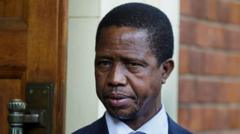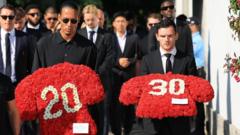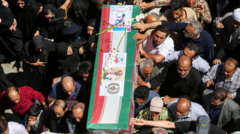*The ongoing dispute surrounding the burial of former President Edgar Lungu underscores deep political divisions in Zambia, questioning cultural traditions and national identity.*
**Zambia’s Political Turmoil Deepens Over Ex-President's Burial Rights**

**Zambia’s Political Turmoil Deepens Over Ex-President's Burial Rights**
*The family of former Zambian President Edgar Lungu is embroiled in a fierce struggle for control over his burial arrangements, igniting national debates.*
In a dramatic unfolding of events reminiscent of a national trophy fight, the struggle over the remains of former Zambian President Edgar Lungu has gripped the country, showcasing not only political divisions but also stirring emotions and traditional values. Two months after his death in a South African hospital, a court granted the Zambian government permission to repatriate Lungu's body for a state funeral, a decision that has been met with anger by his family, who seek to have a say in how their loved one is honored.
The phrase “It's coming home”—traditionally associated with English football supporters—has made its way into the fray, as supporters of the ruling party celebrated the court's ruling on social media, intensifying the emotional stakes of this contentious issue. Celebrations from governing party followers juxtaposed sharply against the heart-wrenching turmoil of Lungu's family, who feel a mix of sorrow and indignation in the aftermath of his passing.
Family members, including Lungu’s sister and widow, are fighting to ensure a burial that aligns with his last wishes, expressing their desire for Hakainde Hichilema, Lungu's successor who triumphed over him in the 2021 elections, to be excluded from any funeral proceedings. The deep-seated animosity between the two political figures, particularly stemming from past incarcerations and tensions, has added layers of complexity to the situation.
Lungu's family had initially agreed to a state funeral arrangement but retreated amid disagreements regarding Hichilema's involvement, which they assert goes against Lungu's wishes. In court, Lungu's sister vocalized her grief and anger toward the government, illustrating the emotional turmoil within the family and the public discourse that revolves around power, legacy, and cultural dignity.
Despite more pressing societal issues demanding attention, including economic challenges, public discussions remain ensnared in this feud, revealing a societal fatigue with the ongoing saga. The absence of concrete legal guidelines on former presidents' burials has left space for political maneuvering, deepening public distrust towards the ruling government, as critics label its actions as politically motivated rather than guided by respect for Lungu’s memory.
Linguistic debates are intertwined with cultural beliefs, adding complexity to this national narrative. Some fear that the government’s insistence on a state funeral could be construed as exploiting Lungu's body for ulterior motives, accentuated by the widespread belief in witchcraft in Zambia. Calls for respecting the family’s autonomy clash with the government’s insistence on honoring Lungu’s status through all traditional protocols reserved for former leaders.
The visibility of the family’s struggle and their determination to honor Lungu's legacy as they see fit continues, with the court's decision set to be challenged in upcoming hearings. The looming question remains: How will Zambia reconcile with its political past, traditions, and the grieving family while navigating this politically charged landscape? The resolution to this deeply personal fight may shape national sentiments long after the debate subsides.
The phrase “It's coming home”—traditionally associated with English football supporters—has made its way into the fray, as supporters of the ruling party celebrated the court's ruling on social media, intensifying the emotional stakes of this contentious issue. Celebrations from governing party followers juxtaposed sharply against the heart-wrenching turmoil of Lungu's family, who feel a mix of sorrow and indignation in the aftermath of his passing.
Family members, including Lungu’s sister and widow, are fighting to ensure a burial that aligns with his last wishes, expressing their desire for Hakainde Hichilema, Lungu's successor who triumphed over him in the 2021 elections, to be excluded from any funeral proceedings. The deep-seated animosity between the two political figures, particularly stemming from past incarcerations and tensions, has added layers of complexity to the situation.
Lungu's family had initially agreed to a state funeral arrangement but retreated amid disagreements regarding Hichilema's involvement, which they assert goes against Lungu's wishes. In court, Lungu's sister vocalized her grief and anger toward the government, illustrating the emotional turmoil within the family and the public discourse that revolves around power, legacy, and cultural dignity.
Despite more pressing societal issues demanding attention, including economic challenges, public discussions remain ensnared in this feud, revealing a societal fatigue with the ongoing saga. The absence of concrete legal guidelines on former presidents' burials has left space for political maneuvering, deepening public distrust towards the ruling government, as critics label its actions as politically motivated rather than guided by respect for Lungu’s memory.
Linguistic debates are intertwined with cultural beliefs, adding complexity to this national narrative. Some fear that the government’s insistence on a state funeral could be construed as exploiting Lungu's body for ulterior motives, accentuated by the widespread belief in witchcraft in Zambia. Calls for respecting the family’s autonomy clash with the government’s insistence on honoring Lungu’s status through all traditional protocols reserved for former leaders.
The visibility of the family’s struggle and their determination to honor Lungu's legacy as they see fit continues, with the court's decision set to be challenged in upcoming hearings. The looming question remains: How will Zambia reconcile with its political past, traditions, and the grieving family while navigating this politically charged landscape? The resolution to this deeply personal fight may shape national sentiments long after the debate subsides.





















